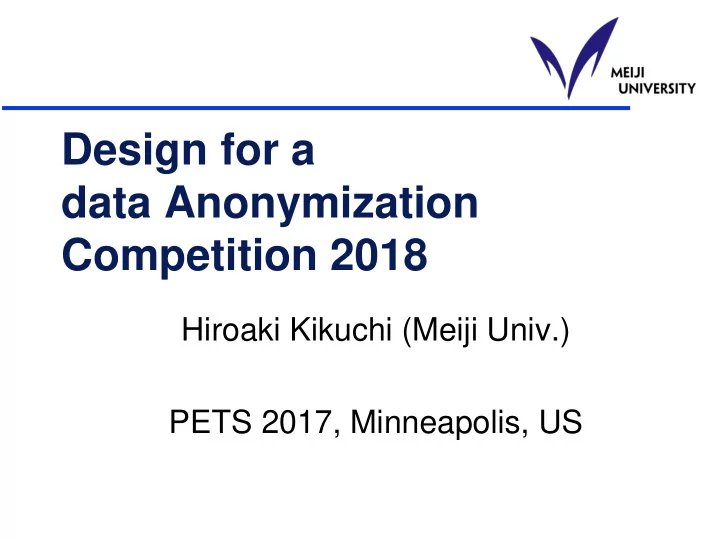

Design for a data Anonymization Competition 2018 Hiroaki Kikuchi (Meiji Univ.) PETS 2017, Minneapolis, US
Criticize to past PWSCUP 1. Hidden algorithm Players submit the anonymized data without showing source or algorithm. Not able to analyze the process for details. 2. Max-knowledge assumption is too strong. It is far from reality. 3. Record-linkage challenge is problematic. Instead, why don’t us to attribute estimation? 4. Synchronized fashion of games Arbitrarily attack and defense is more exciting, like the CTF style.
Open-Source style iDash Privacy and Security WS
1. Pros and Cons for Open-Source style Pros Cons Allows deep analysis Revealing method is prohibited by Can be re-used for Japanese low anonymizing other dataset. Most companies does not allow to Fair and reliable. submit their source Allows to trace the since it has IP. steps one by one. Not processed in a “cheating” can be single source. Often denied. used internal library. No need high- performance
Our Suggestion to 1. We should have a closed-source (PWSCUP) style so that industry teams can participate. Alternatively, we may have an additional open-source style completion as well as the closed-style.
2. Why we assume the Max- knowledge adversary Reasons It is simple. If some algorithm was better than others in the Max-knowledge adversary, it could be safe against a moderate adversary. Many requests to join both anonymizing and re-identifying. (including committee members) It is hard to provide exactly equal knowledge to all parties. The risk may quite depend on the (partial) knowledge.
3. Why we did not study attribute estimation in the past PWSCUP M (QID) T (SA) name year good payment H. Kikuchi 24 coffee 320 H. Kikuchi 24 tea 280 Illegal Anonymize 1. Re-identification risk (de-identification) 4. contact to Legal subject 1055 20s beverage 300 2. records Legal 1055 20s beverage 200 linked to the same person tea 3. estimate hidden attribute other DB value (inference risk) 5. matching to Legal other resource Illegal
Our new competition Update PWSCUP 2017
PWS CUP 2017 (Japan) Oct. 23-25 Yamagata Int. Hotel Call (July 24-Aug. 21) Privacy Workshop 2017 (IPSJ, Sig. CSEC)
submit T’1, T’2, T’3, … Anonymize : 2017 Outline given T’1 , T’2, guess IDs Identification : T 1 T 2 M ID date good ID Sex C ID Date good 12347 2010/3/7 85 12346 f UK 12347 2010/1/7 85 12347 2010/4/7 22 12347 f UK 12347 2010/2/7 22 12348 m DE 12346 2011/3/3 30 12346 2011/1/18 66 Anonymization T’ 1 T’ 2 Pse Date good ID ID Pse Date good 60 2010/3/7 85 ✓ 30 2010/1/7 85 12346 20 ✓ 60 2010/4/7 22 12347 30 30 2010/2/7 22 ✓ 40 2011/3/3 30 12346 40 20 2011/1/18 66 12347 50 12347 2010/1/7 85 Partial knowledge of Ts Re-id = .75 12346 2011/1/18 66
1-year History divided cnt <- zoo(t400$V7, d400) cnt.weekly <- apply.weekly(as.xts(cnt), length)
Changes in 2017 1. anonymization of long history Allows multiple pseudonyms per one person so that re-identification becomes harder The more pseudonym, the more secure. But, it accordingly loses the utility. 2. weaken the adversary’s knowledge Given (some) partial transaction records, try to estimate model and guess the assignment
Some plans for Competition
Proposal of completion 2018 Plan A. NSTAC synthesized data Plan B. Online Retail Plan C. Online Retail with pseudonyms Plan D. Open Algorithms completion Plan E. Trajectory Data
Plan A "Pseudo Micro Data" NSTAC (National Statistics Center) Real statistics about income and expenditure for Japanese household in 2004. Dataset # of QI SA records n m (exp) (inc) Full 32,027 14 149 34 http://www.nstac.go.jp/services/giji-microdata.html#P2 Simple 8,333 14 11 N/A
Pseudo Micro Data (Tbl. VII) No Attribute # of value Average Example Type 1 Type 1 1 1 (empied) QID 2 # of people 1 4 4 QID 3 # of employed 1 1.504 1 QID 4 Accom. Type 5 1 1 (wooden) QID 5 Bldg. type 7 1 1 (detached) QID 6 Owner 8 1 1 (owned) QID 7 Sex 1 1 1 (male) QID 8 Age 11 5 1 (1-18 Y/O) QID … QID 14 Weight 8333 15.741 13.2 SA 15 Total Expenditures 8333 324,525 155,006 SA 16 Foods 8333 74,639 25,227 SA 17 Accom. 8333 14,686 2000 SA 14 Lightning 8333 19,733 18,333 SA … SA 25 Others 8333 62,227 20,455 SA
Record Re-identification anonymized estimated record record original record index sequence index sequence index sequence X 1 X 2 X 1 X 2 I Y I E I X wrong 1 0 22 4 1 60 3 correct 2 1 88 1 0 20 1 correct 3 1 55 2 1 80 2 4 0 66 Re-id E = 2/3 mapping 𝜌 anonymized Y dataset X Re-identification Ratio: Re-id IE (I Y , I E ) = |{j in {1,…,n’} | i j E }/n’ Y =i j
Plan B: Online Retail Dataset UCI Machine Learning, “Online Retail” Task Identify secret permutation P(M) from anonymized data M’ and T’ Limitation Assign one pseudonym to one customer
Plan C: Online Retail with Many Pseudonyms Dataset UCI Machine Learning, “Online Retail” Task Identify owners of records from anonymized history T’ using partial knowledge Limitation Assign one pseudonym to one customer
Plan D: Open-source style competition Data:
Plan E: Trajectory Data Competition
Recommend
More recommend